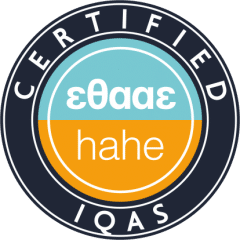
PhD Student
kchristopoulou@uniwa.gr
University Campus 1 (via email only)
Konstantina Christopoulou is a PhD researcher at the Department of Archival, Library and Information Studies of the University of West Attica.
She has graduated from the Department of Informatics and Telecommunications of the University of Peloponnese, earning her BSc diploma in Informatics and Telecommunications, majoring in Informatics, and her MSc diploma in Computer Science with Distinction.
She was a member of ΓΑΒ LAB – Knowledge and Uncertainty Research Laboratory, in charge of bookkeeping of members and press releases, formation of reports, technical texts and deliverables, and design of educational programs for students of the Secondary Education Schools of the Peloponnese Region for the school year 2018-2019. Now she is a member of the Information Management Research Lab.
She has worked as a Designer, Analyst and Computer System Programmer at the Department of Environment and Regional Design of the Municipality of Peloponnese and as a Data Scientist at the Public Water Supply and Sewerage Company of Tripolis (D.E.Y.A.T.).
Currently, she is working as a secondary teacher, teaching Computer Science, Informatics and Programming for the Department of Secondary Education in Athens.
Moreover, she has participated in numerous projects and events for CrossCult, Cern and Code Week.
Research Interests: Data Analysis, Semantic Web, Cultural Informatics, Education, Curriculum Design, Distance Learning, e-Learning, Equality Diversity and Inclusion in Education, Ontological Modeling, Digital Libraries
LinkedIn Profile: https://www.linkedin.com/in/dinachristopoulou/
ResearchGate Profile: https://www.researchgate.net/profile/Konstantina_Christopoulou3
Proposal’s Title: Extension and optimization of the evaluation mechanisms of the academic and research activity in the context of Open Science
Short description: The continuous and increasing development in science and research worldwide has created a need for designing new and multidimensional criteria for evaluating the quality of scientific research in both academic and non-academic environments. By Open Science, we are referring to the transition of scientific production to a new phase, in which there are changes in the way research is carried out, in the collaboration between researchers, in the way knowledge is distributed (Open Access – Open Data), evaluated (Open Science Evaluation) and organized (Open Science Policies and Tools). The evaluation of trends in scientific research and, needs, ethical issues and risk management could offer useful tools for Higher Education Institutions’ prosperity through the evaluation criteria according to the guidelines of Open Science. This can be a reliable indicator of the Economic State of a University and assist in presenting the University’s image and level of research, comparing it with other Universities, influencing other Universities, funders, companies and society.
This research’s main goal is to evaluate, improve and combine already existing and new methods of estimating the success of a scientific research [bibliometrics, informetrics, scientometrics, webmetrics – cybermetrics, librametrics, patentometrics, altmetrics – article level metrics, semantometrics. Especially during the theoretical study, existing criteria will be combined in order to create new, improved indicators. These indicators will present the quality and the evaluation of the scientific research, which criteria will be directly and indirectly linked with qualitative characteristics. The way these indicators exist, the combination of them, the new indicators will be investigated to determine the «friendliness» of the research according to the Open Science principles.



